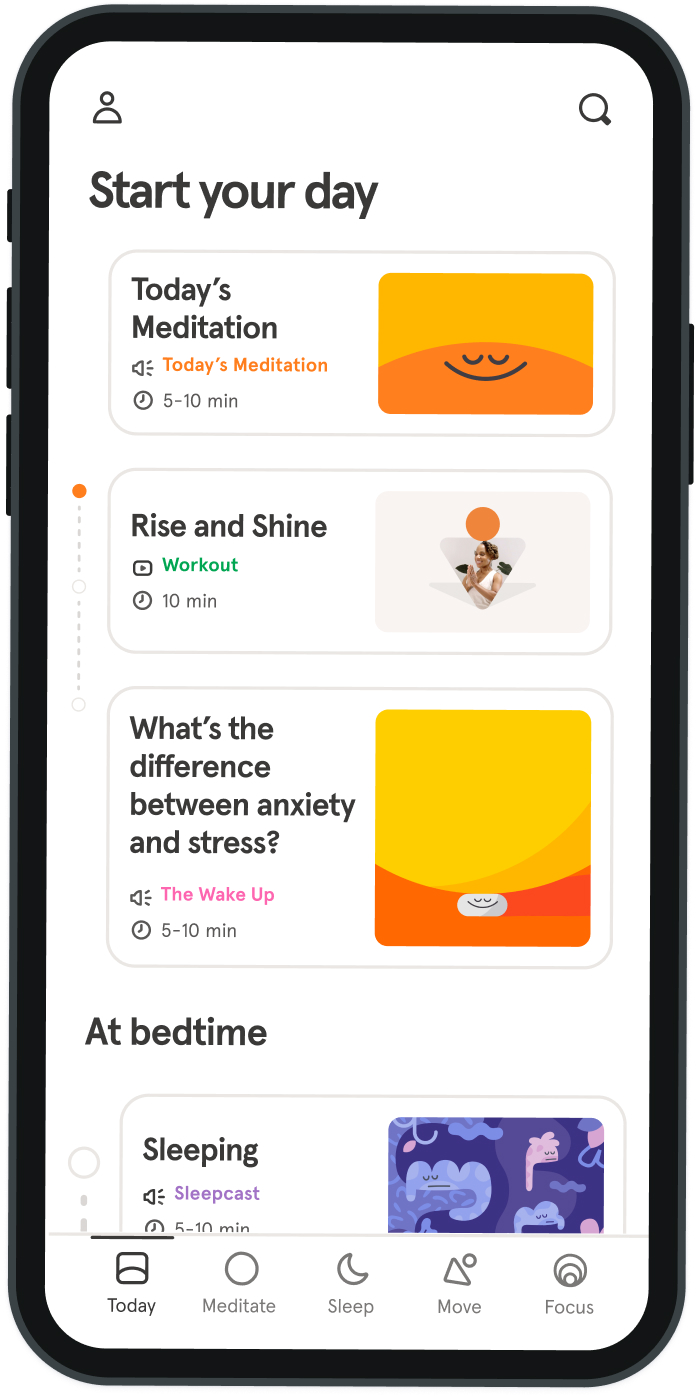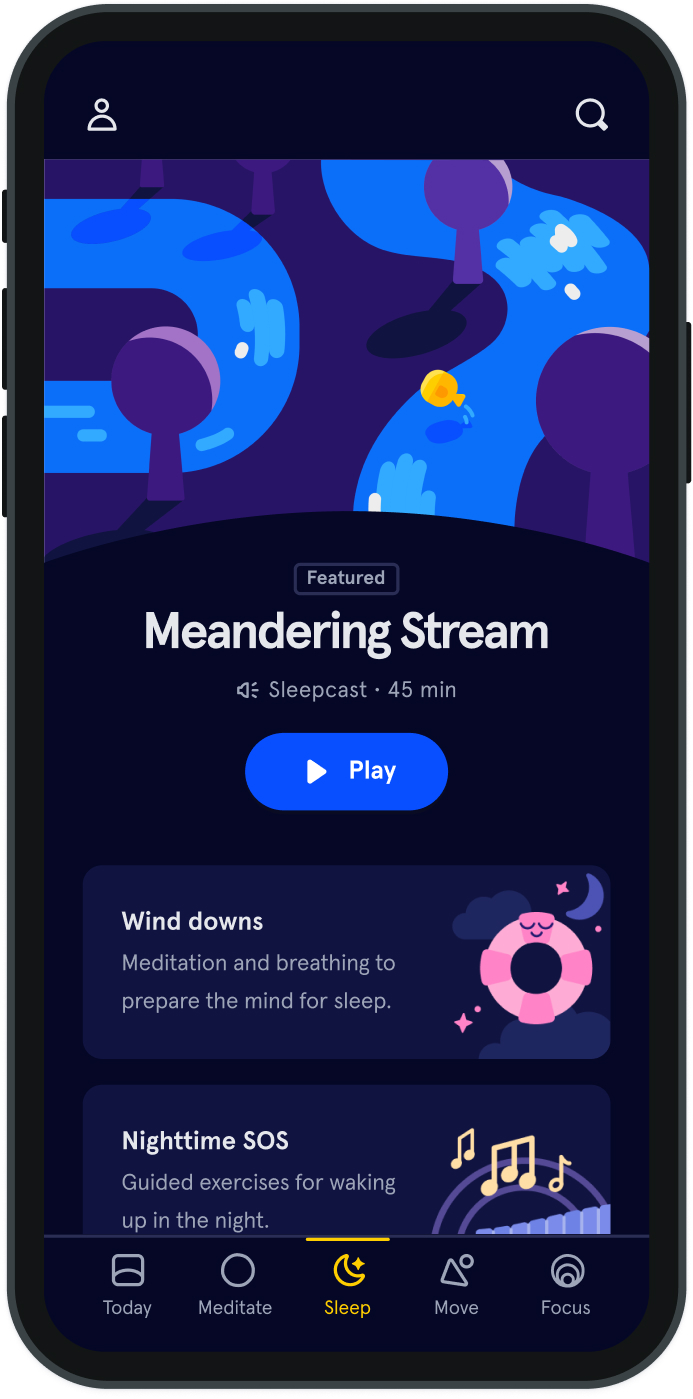How to break bad habits with your brain
Chances are, you have a bad habit or two. (We all do!) They might range from glancing at your phone too often, hitting the snooze button instead of going to workout, or mindlessly snacking while watching TV. If you’ve ever tried to quit a bad habit, you know how tough that can be to accomplish.
People who’ve quit smoking may have sought out therapy, nail biters might have enlisted a product to help, and overeaters may have joined a support group. But, what if we had access to the tools to break bad habits with us all the time? (Turns out, we might.) It’s called a mindfulness practice and we can rely on these skills to help stop bad habits. Here’s how mindfulness can help end negative habits and build new ones.
How are habits formed?
A small region of the brain’s prefrontal cortex, where most of our thoughts and planning take place, is responsible for the moment-by-moment control of habits that are switched on at any given time, according to neuroscientists at MIT. Research has found that although habits may be deeply ingrained, the brain’s planning centers can shut them off, according to the study published in Proceedings of the National Academy of Sciences. Once a behavior becomes automatic, the decision-making part of your brain can go into a sleep-like state—so you might not be aware that you’re doing it. The more you do something over and over, the easier it is for your brain to create a pattern and automate that response for next time. So if you hit snooze on your alarm four days this week when you planned to work out, your brain is being primed to tell you to repeat that action next time your alarm sounds.
Why is it so tough for bad habits to go away?
If you’re trying to quit snacking at night, you might be better off changing your routine—like sipping a cup of herbal tea while watching TV—rather than simply fighting the urge to nosh all night long. That’s because the cortex of the brain never completely forgets old practices, but it favors new habits over old ones. We also tend to fall prey to our bad habits and seek comfort in those routines when we’re emotionally taxed.
Why mindfulness is a great tool for breaking habits
Practicing mindfulness has been shown to activate the brain’s prefrontal cortex which is associated with concentration, planning and decision making, and can shrink the right amygdala, which is associated with fear and negative emotion. Just like improving anything in your life—whether it’s running or playing the guitar—the more you practice mindfulness, the more ease you will find doing it. In order to break a bad habit, you have to be aware that it’s happening, get present, and change your behavior. In his TED Talk, psychiatrist Judson Brewer discusses the relationship between mindfulness and addiction. He says that the brain follows a pattern: trigger, behavior, then reward. If a sweet treat made you feel better the last time you were in a bad mood, the brain says, “Hey, next time you feel bad, eat something that makes you feel good and we’ll feel happy again!” Or, if a cigarette helps take the edge off after a particularly taxing meeting, even though your brain knows it’s bad for you, your body seeks that pleasure and relief. “But, what if you tapped into the natural reward-based learning process instead?” Brewer asks in his talk. He found that being “curious and aware” while smoking made study participants realize that it tastes and smells gross. The prefrontal cortex understands that you shouldn’t smoke and overeat, and it wants to help you control behavior, but that part of your brain goes ‘offline’ when you’re stressed. This is why it’s easy to fall back into bad habits. Mindfulness shows us what’s going on at a given moment, so we can assess our actions and let go of old habits and form new ones. Mindfulness involves being curious about what’s going on, which can be a rewarding experience for the brain. Curiosity might make you realize that you’re feeling restless or stressed. “When we get curious, we step out of our old fear-based reactive habit patterns, and we step into being,” said Brewer. In a 2011 study published in the journal of Drug and Alcohol Dependence that Brewer worked on, researchers found that mindfulness training was twice as successful at encouraging smokers to quit as the American Lung Association's “freedom from smoking” treatment. Mindfulness-based interventions are being explored in the research community as a way of helping people better cope with negative emotions and stress, especially in obese and overweight demographics. An article written by Ronald M. Epstein, M.D., explores mindfulness in medicine and describes mindfulness as: “attentive observation, critical curiosity, informed flexibility and presence.” Epstein believes “habits of mind include the cognitive, emotional, and technical domains.” Asking yourself a question might help disrupt habitual and rigid patterns of thought and behavior to allow a familiar situation to be seen in a new way, said Epstein in his article. It can train you to be present and observe. The next time you find yourself mindlessly participating in a bad habit, take a few deep breaths to get present. Ask yourself, Why am I doing this? See what answers come to mind. You may want to follow that up with, What other habits can I practice instead? Some options include changing your environment, calling a friend, listening to music, going on a walk, or pulling out your headphones and listening to a meditation. Chances are, once you distract yourself from the bad habit—and keep doing it repeatedly—your brain will start to realize that you’re moving away from that pattern and look for new ones to adopt.
Why mindfulness is a great tool for breaking habits
Practicing mindfulness has been shown to activate the brain’s prefrontal cortex which is associated with concentration, planning and decision making, and can shrink the right amygdala, which is associated with fear and negative emotion. Just like improving anything in your life—whether it’s running or playing the guitar—the more you practice mindfulness, the more ease you will find doing it. In order to break a bad habit, you have to be aware that it’s happening, get present, and change your behavior. In his TED Talk, psychiatrist Judson Brewer discusses the relationship between mindfulness and addiction. He says that the brain follows a pattern: trigger, behavior, then reward. If a sweet treat made you feel better the last time you were in a bad mood, the brain says, “Hey, next time you feel bad, eat something that makes you feel good and we’ll feel happy again!” Or, if a cigarette helps take the edge off after a particularly taxing meeting, even though your brain knows it’s bad for you, your body seeks that pleasure and relief. “But, what if you tapped into the natural reward-based learning process instead?” Brewer asks in his talk. He found that being “curious and aware” while smoking made study participants realize that it tastes and smells gross. The prefrontal cortex understands that you shouldn’t smoke and overeat, and it wants to help you control behavior, but that part of your brain goes ‘offline’ when you’re stressed. This is why it’s easy to fall back into bad habits. Mindfulness shows us what’s going on at a given moment, so we can assess our actions and let go of old habits and form new ones. Mindfulness involves being curious about what’s going on, which can be a rewarding experience for the brain. Curiosity might make you realize that you’re feeling restless or stressed. “When we get curious, we step out of our old fear-based reactive habit patterns, and we step into being,” said Brewer.
In a 2011 study published in the journal of Drug and Alcohol Dependence that Brewer worked on, researchers found that mindfulness training was twice as successful at encouraging smokers to quit as the American Lung Association's “freedom from smoking” treatment. Mindfulness-based interventions are being explored in the research community as a way of helping people better cope with negative emotions and stress, especially in obese and overweight demographics. An article written by Ronald M. Epstein, M.D., explores mindfulness in medicine and describes mindfulness as: “attentive observation, critical curiosity, informed flexibility and presence.” Epstein believes “habits of mind include the cognitive, emotional, and technical domains.” Asking yourself a question might help disrupt habitual and rigid patterns of thought and behavior to allow a familiar situation to be seen in a new way, said Epstein in his article. It can train you to be present and observe. The next time you find yourself mindlessly participating in a bad habit, take a few deep breaths to get present. Ask yourself, Why am I doing this? See what answers come to mind. You may want to follow that up with, What other habits can I practice instead? Some options include changing your environment, calling a friend, listening to music, going on a walk, or pulling out your headphones and listening to a meditation. Chances are, once you distract yourself from the bad habit—and keep doing it repeatedly—your brain will start to realize that you’re moving away from that pattern and look for new ones to adopt. This piece was produced in partnership with Nike Training Club. To get started on your fitness journey, download the NTC app here.



Be kind to your mind
- Access the full library of 500+ meditations on everything from stress, to resilience, to compassion
- Put your mind to bed with sleep sounds, music, and wind-down exercises
- Make mindfulness a part of your daily routine with tension-releasing workouts, relaxing yoga, Focus music playlists, and more
Meditation and mindfulness for any mind, any mood, any goal

Stay in the loop
Be the first to get updates on our latest content, special offers, and new features.
By signing up, you’re agreeing to receive marketing emails from Headspace. You can unsubscribe at any time. For more details, check out our Privacy Policy.
- © 2025 Headspace Inc.
- Terms & conditions
- Privacy policy
- Consumer Health Data
- Your privacy choices
- CA Privacy Notice
